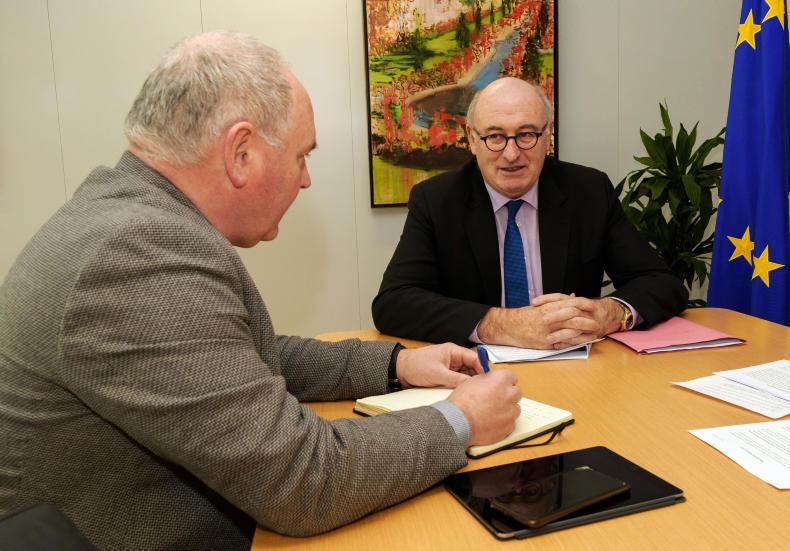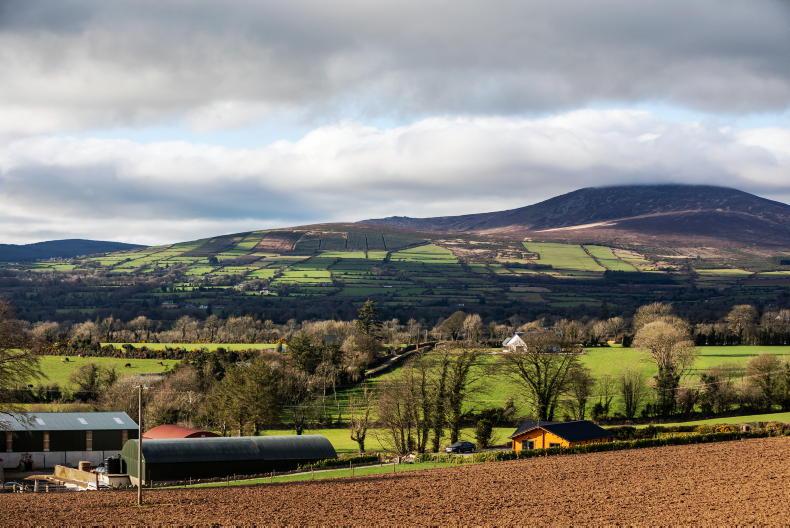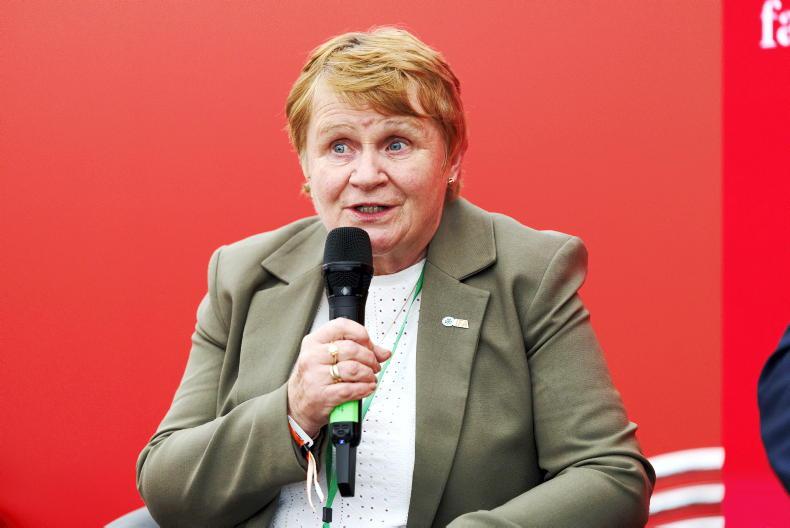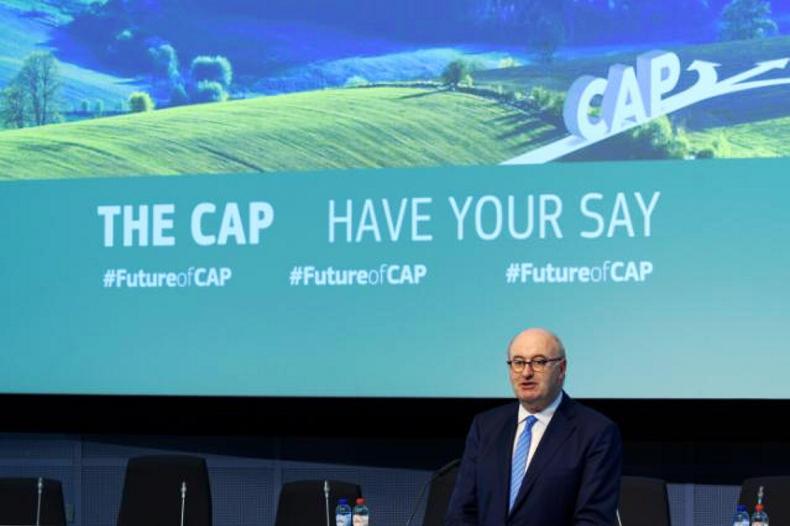Phelim O’Neill (PON): Will there be a ceiling on payments in CAP 2020?
Commissioner Phil Hogan (PH): We have options in the current CAP around capping and degressivity and a small farmer’s payment scheme but it is a voluntary measure left to the member states on whether they wish to implement it or not.
PON: Do you intend suggesting a number to them?
PH: We have looked at options in relation to figures of €60,000 to €100,000 but it is a matter for the member states and the European Parliament to decide what the figure should be and if it should be mandatory or voluntary.
PON: On degressive payments, are you suggesting this should be made an EU-wide policy rather than left to individual member states?
PH: That is something we have to get agreement from the Council of Ministers and the European Parliament … ultimately they will make the final decision. What we are saying is there is a need for more fairness in the manner in which payments are applied in member states and there are opportunities there – even existing opportunities – where member states can implement some of the proposals that are in the debate, like capping, like degressivity and redistributive payments towards small farmers.
PON: A focus on redistributing payments to small and medium farmers is something that Irish farmers would agree with but isn’t there a difficulty with where you classify what farmer is at what level and where the fair point is?
PH: The whole direction of our proposals is to give more input in terms of implementing policies to the member state, so we will give the maximum flexibility and options to decide what type of redistribution of payments or what level of capping or what manner of degressivity is applied once there is adherence to objectives that will be set out in the CAP.
PON: You want to make sure the support is targeted to what you call genuine farmers and focus on those that are actively farming. Can you see how that will be defined and clarified?
PH: I want to give the maximum support in the CAP to the people that are earning a living from agriculture, and we have during the recent Omnibus regulation given again an opportunity for member states to be able to define the payments to active farmers … it is going to be a matter again for the member states to decide what their definition is of an active farmer.
PON: What is the main difference farmers will see between CAP 2020 and the present CAP?
PH: We want to simplify the policy and this requires a change in the controls system, a change in the notion that we have two sets of controls at the moment for one policy. We want to use more technology [satellite] rather than human interaction with farmers in relation to complying with the rules. We want more programmes and policies to fit the circumstances of the farmer, and more input by farmers and their organisations in terms of the implementation of the new policy. There will be more support for young farmers and a greater link of all payments to environmental and climate ambitions.
PON: Will the issue of [Areas of Natural Constraint] ANCs be moved back to 2019?
PH: We have made the necessary arrangements in the Omnibus regulation to allow the ANC be pushed back to 2019 if the member state wishes to do so.
PON: Will the UK be having an input to this CAP given that it will be a member when it is being formulated but likely to have left when it comes into effect?
PH: I would expect that this decision will be made by the three institutions together at the end of the negotiations in October 2018.
PON: You are not being specific on what contribution the UK will make other than their role in the EU institutions?
PH: A lot will depend on what the final outcome is of the negotiations and then I expect that if there is a definitive move towards the exit by the UK, that it will have an impact in terms of when that decision will be made.
PON: If there have to be budget cuts, will they be spread equally across all member states or will the amount of payments a country is getting determine the level of any cuts?
PH: It is too soon to say what action we will take because we don’t know the budget at this stage and these decisions will be made in May 2018 in the context of the proposal to publish the multi-financial framework.
PON: Is there any potential in this CAP to have payments calculated on the profitability of the different sectors or are we staying on the land-based model?
PH: We generally find it difficult to get people to admit they are profitable in any sector of agriculture, but these are decisions that will be made as part of the legislative process and in the legislative proposal that will be made in the middle of 2018. We haven’t come to any conclusions yet.
PON: Will the dual mechanism of support payments and intervention purchasing come under scrutiny in this CAP?
PH: We have to continue to have some support for specific sectors that are very important to us in terms of our exports, and if we don’t have a market-orientated policy that is able to give us some safety net to those exposed sectors, we will be heavily criticised. If specific sectors come under pressure, there is a need to have a crisis fund available to support once-off difficulties that emerge through no fault of the farmer or unexpectedly on the part of the market. I expect there will continue to be a fund that we will use to deal with crisis management as we have now.
PON: Can the EU use the US crop insurance model?
PH: It is already available and its availability will, I expect, improve significantly in the coming years due to the recent decision of the European Parliament and Agriculture Council ministers to make it more attractive for insurance products as part of the Omnibus regulations. It is something we welcome in the Omnibus regulation and we intend to support it.
PON: Looking at sheep – you set up a sheep forum, will you have specific proposals for sheep in the 2020 CAP?
PH: We will be looking at everything in the wide piece but there are already existing measures like direct payments, ANCs, voluntary coupled support and upland farmer’s payment for those living in those geographical areas available in the Rural Development Programme that help the sheep sector as well as all sectors. We will certainly be anxious to ensure that the sheep sector remains viable in the context of the environmental obligations that we want our farmers to participate in.
PON: Would you see the possibility in CAP 2020 of a payment for suckler cows?
PH: Those particular payments are already available to member states if they wish to utilise them under the Rural Development Programme and it is a matter for the CAP plan that we will be asking member states to submit to us for approval and it is a matter for the Minister of Agriculture of the day to make those choices.
PON: Will you be using the present reference year for CAP 2020?
PH: Again, we haven’t decided – what we are discussing are the general principles that will be guide our policy towards 2020 and the detail will come in the legislative proposals in 2018.










SHARING OPTIONS